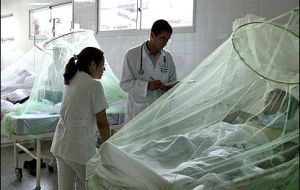MercoPress. South Atlantic News Agency
Dengue fever forces Paraguay to declare “national emergency”
 Paraguayan Congress declared a 60 days “national emergency”
Paraguayan Congress declared a 60 days “national emergency” Faced with 100.000 cases of dengue infection which have also caused several deaths Paraguayan Congress declared this week a 60 days “national emergency” and voted funds to combat the Aedes agypty mosquito which transmits the disease.
Members of the opposition called for the resignation of the Minister of Health who is accused of "negligence" having proved "he has been utterly incapable of controlling the disease and preventing its spread". Thousands flood every day clinics and hospitals fearing they have the symptoms of the disease which has spread to urban areas of the landlocked South American country following a summer of intense tropical rains. The Congressional spokesman for the ruling party Martín Chiola said that with the approval of the "national emergency" contingency funds will be released for the purchase of medicines, fumigation of towns, villages and cities, and for funding prevention campaigns to teach people about the risks of stagnant water where the larvae of the mosquitoes breed. Paraguayan president Nicanor Duarte said that the best way to combat the epidemic is education and healthy habits. People must know that "accumulation of garbage and stagnant water must be eliminated if the disease is to be controlled". Dengue and its most fearsome version hemorrhagic dengue, which usually is fatal, is endemic in Paraguay and most of the Americas. Only Canada and Uruguay are free of the disease. The last serious outbreak was five years ago in Brazil when up to 800.000 people were infected and several dozen people died. According to the World Health Organization dengue fever is a severe, flu-like illness that affects infants, young children and adults, but seldom causes death. The clinical features of dengue fever vary according to the age of the patient. Infants and young children may have a non-specific febrile illness with rash. Older children and adults may have either a mild febrile syndrome or the classical incapacitating disease with abrupt onset and high fever, severe headache, pain behind the eyes, muscle and joint pains, and rash. Dengue hemorrhagic fever is a potentially deadly complication that is characterized by high fever, hemorrhagic phenomena--often with enlargement of the liver--and in severe cases, circulatory failure. The illness commonly begins with a sudden rise in temperature accompanied by facial flush and other non-specific constitutional symptoms of dengue fever. The fever usually continues for two to seven days and can be as high as 40-41°C, possibly with febrile convulsions and hemorrhagic phenomena. In moderate DHF cases, all signs and symptoms abate after the fever subsides. In severe cases, the patient's condition may suddenly deteriorate after a few days of fever; the temperature drops, followed by signs of circulatory failure, and the patient may rapidly go into a critical state of shock and die within 12-24 hours, or quickly recover following appropriate volume replacement therapy.




Top Comments
Disclaimer & comment rulesCommenting for this story is now closed.
If you have a Facebook account, become a fan and comment on our Facebook Page!